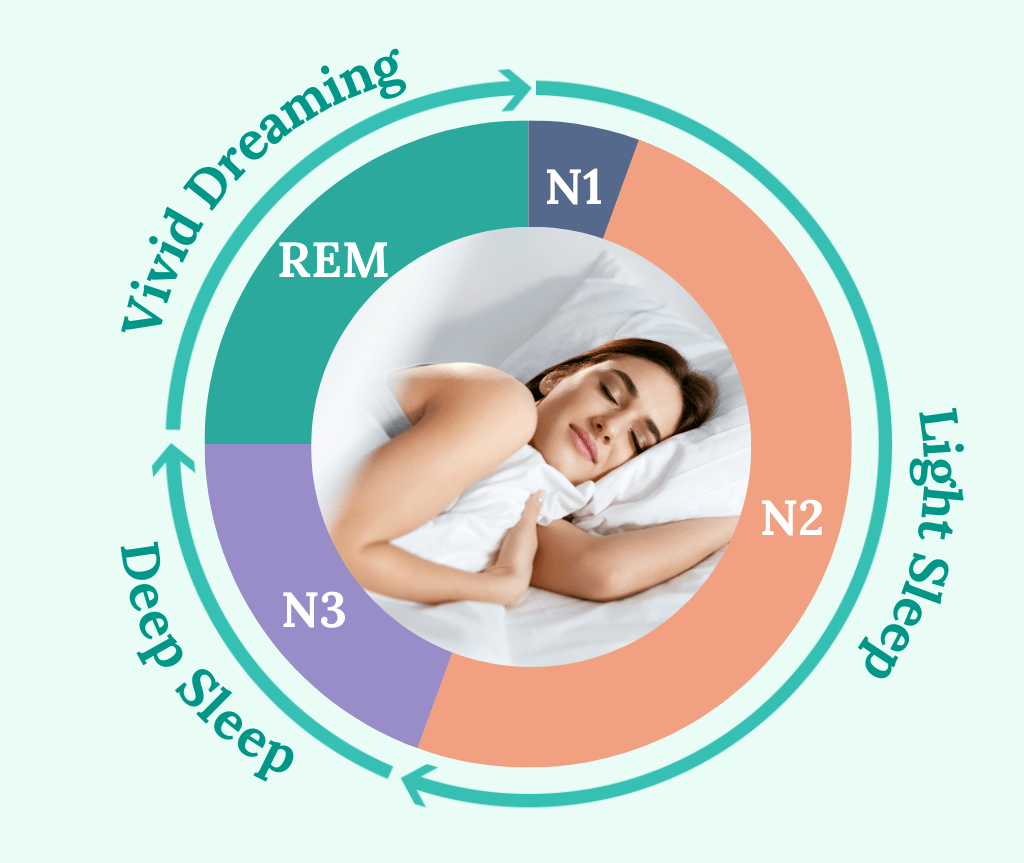Think about the last time you woke up feeling truly rested — clear-headed, energised, maybe even joyful before your first coffee. Those mornings remind us of something simple yet profound: the profound connection between the way we sleep and our wellness.
Sleep isn’t a luxury or a reward; it’s a biological necessity — your body’s built-in repair system that restores your mind, mood, and energy every single night. When you protect your sleep, you protect your overall wellness — the balance that allows you to think clearly, move with ease, and feel like yourself again.
The Science of Sleep
Sleep isn’t just about switching off; it’s a carefully orchestrated rhythm that renews you from the inside out.
Each night, your body cycles through four to five 90-minute stages, each with its own specific function.
- N1 (Light Sleep): You drift off. Heart rate slows, breathing deepens, and your body begins to let go.
- N2 (Deeper Sleep): The outside world fades. Muscles relax, brain activity slows, and the body begins to repair itself.
- N3 (Deep Sleep): This is your body’s workshop — where tissues heal, growth hormone surges, and energy stores rebuild.
REM (Rapid Eye Movement): Dreams arrive. The brain becomes active again, sorting emotions, processing memories, and filing away the day.
Early in the night, your body begins to lean into deep, physical recovery. In the morning, REM sleep enhances memory, creativity, and emotional balance. Both matter — and both are easily disrupted when you short-change your sleep.
Why Sleep and Wellness Are Deeply Intertwined
When sleep suffers, almost everything else does too.
Your mind feels it first.
Even one restless night can heighten stress and dull your focus. Chronic sleep loss has been linked to increased anxiety and low mood, as your brain struggles to regulate cortisol and serotonin.
Your body follows.
Poor sleep disturbs hormones that control appetite and metabolism — ghrelin tells you you’re hungry, leptin signals fullness. Without enough rest, those signals misfire, driving late-night cravings and sluggish energy. Over time, this imbalance raises the risk of weight gain, insulin resistance, and heart issues.
Your immune system notices too.
While you sleep, your body produces cytokines — proteins that fight infection and calm inflammation. When sleep is cut short, this process is weakened, leaving you more vulnerable to illness and slower to recover.
In essence, sleep is the foundation of wellness — nourishing your brain, balancing your hormones, and fuelling your resilience from the inside out.
What Shapes Your Sleep Quality
If you’re struggling to drift off or wake up groggy, the cause might be closer than you think.
Your environment matters.
Light, temperature, and even the hum of electronics can interfere with your natural rhythms. Blue light from phones and laptops delays the release of melatonin, confusing your body’s sense of night and day.
Lifestyle choices count.
A late latte or a glass of wine might seem harmless, but both can fragment sleep. Caffeine lingers for hours; alcohol may help you fall asleep, but it reduces REM, leading to restless, shallow rest.
Health conditions play a role.
Sleep apnoea and restless legs syndrome are common yet underdiagnosed. They leave you exhausted despite “a full night’s sleep.”
And yes — age makes a difference.
As we age, deep sleep tends to become shorter. That doesn’t mean you can’t rest well; it just means your body needs more support to wind down.
How to Sleep Better — Starting Tonight
You don’t need a total lifestyle overhaul. Often, a few gentle rituals make all the difference.
- Set a rhythm your body can rely on. Go to bed and wake up at roughly the same time, even on weekends.
- Dim the lights. An hour before bed, lower brightness, silence notifications, and let your senses settle.
- Keep it cool and quiet. A temperature of around 18°C is ideal for most people.
- Unplug to unwind. Swap screens for a calming playlist, journaling, or gentle stretching.
- Get natural light in the morning. It resets your internal clock and boosts alertness for the day ahead.
Ask for help if needed. Persistent fatigue or loud snoring can be signs of treatable sleep disorders.
Each small habit is a vote for your future energy, mood, and health.
The Bottom Line
Good sleep is not indulgent — it’s healing. It rebuilds what stress breaks down, steadies your emotions, and strengthens every cell in your body.
Try one shift tonight. Lower the lights, breathe deeply, and permit yourself to rest. Your body will remember how — it’s wired to.



